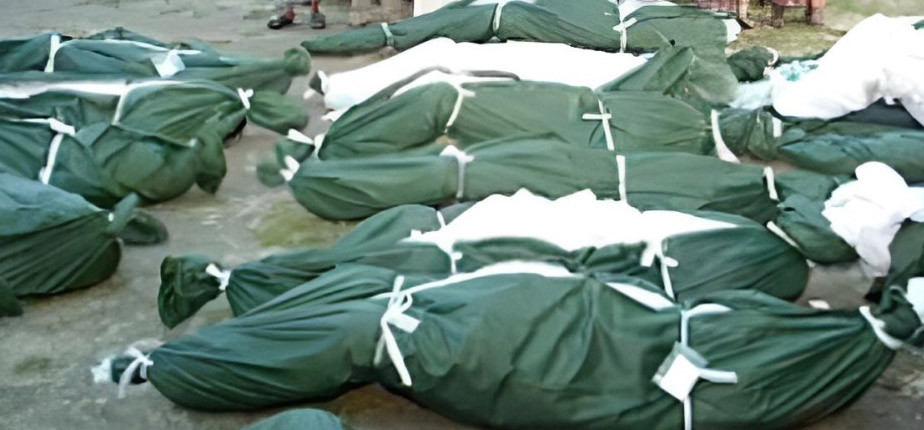
Elham Asaad Buaras
On October 28, a court in southern Thailand dismissed charges against former security personnel and officials tied to the deaths of 85 ethnic Malay Muslim protesters in 2004. The dismissal was attributed to the suspects’ evasion of arrest, as the 20-year statute of limitations expired on October 25.
Known as the Tak Bai Massacre, the incident has left families of the victims seeking justice for nearly two decades. The charges included accusations of murder, attempted murder, and unlawful detention against seven soldiers and government officials. Although the Narathiwat Provincial Court initially accepted the case in August, the inability to apprehend any suspects led to the case’s eventual dismissal.
In a statement, the court clarified that this was not a formal acquittal, as the suspects had “never entered the legal proceedings but fled until the statute of limitations expired.” Among those implicated was Pisal Wattanawongkiri, the former commander of the 4th Army Region. He was serving as a Pheu Thai party lawmaker at the time of the indictment but reportedly resigned after filing for medical leave to seek treatment abroad. Several other suspects are also believed to have fled the country following the indictment.
The Tak Bai Massacre drew international attention due to the horrifying circumstances under which the protesters lost their lives. On October 25, 2004, thousands gathered outside the Narathiwat police station to demand the release of six detained Muslim men. As tensions escalated, violence broke out, and security forces opened fire, killing seven protesters on the spot.
Following the chaos, security forces detained 1,370 protesters. Women and children were separated from the male detainees, who were ordered to lie face down and remove their shirts. These shirts, along with ropes, were used to bind their hands behind their backs. Reports indicate that soldiers beat and kicked detainees, even striking some with rifle butts.
When authorities failed to identify the protest leaders, Pisal Wattanawongkiri ordered the mass transport of all detainees to the Ingkhayuthboriharn army camp in Pattani province, near the Malaysian border. The 145-kilometre journey required 26 military trucks, each packed with around 50 detainees overseen by four soldiers.
Devastatingly, soldiers forced the detainees to lie face down, stacking them in three to five layers on top of one another. They reportedly struck anyone who made noise or begged for help. By the time the trucks reached the Pattani army base, 78 detainees had died from suffocation or crushing injuries, while many others were left with severe injuries.
The nightmare did not end there. Survivors were held for several days without adequate medical care. Many suffered long-term injuries, with some requiring amputations due to the lack of timely medical attention.
This tragedy deepened resentment in Thailand’s southern provinces, where Muslim communities have long reported discrimination in a predominantly Buddhist nation. Separatist movements and government crackdowns have only exacerbated tensions. While the insurgency in the region has since calmed, sporadic violence persists.
On Oct. 25, 2004, Thai security forces violently dispersed ethnic Malay Muslim protesters in southern Thailand.
For two decades, successive Thai governments have failed to hold any former officials accountable for the massacre at Tak Bai. https://t.co/egR4LV1aHc pic.twitter.com/tW0xmu4wF6
— Human Rights Watch (@hrw) October 30, 2024
Reacting to the dismissal of charges, Ratsada Manooratsada, the lawyer representing the victims’ families, expressed deep frustration but vowed to explore alternative legal avenues. He also hinted at investigating potential police delays in advancing the case. “The statute of limitations in the memory of the people will never expire,” he said.
Calls for justice have also resonated internationally. The previous week, UN special rapporteurs urged Thailand to continue the investigation and uphold justice, highlighting that failing to hold perpetrators accountable constitutes a breach of Thailand’s human rights obligations. In response, Prime Minister Paetongtarn Shinawatra offered an official apology. She noted that all relevant agencies had made efforts to pursue justice and promised to prevent similar incidents in the future.
The commemoration of the tragedy has also kept the memory alive. Two days before the statute of limitations expired Thai Muslims and activists organised a cycling campaign retracing the route taken by the victims who died of suffocation during their transport.
Prime Minister Paetongtarn, whose father, Thaksin Shinawatra, was in office at the time of the massacre, issued an apology “on behalf of the government for what happened in Tak Bai 20 years ago.” She expressed sorrow for the victims and their families, noting that financial compensation had been provided. “I hope everyone remains mindful of the violence that occurred in the Tak Bai case. No one wants to see such an incident happen again. Every party, including the government, should do their best to ensure it doesn’t happen in the future,” she said.
However, human rights activists argue that words alone are insufficient. Human Rights Watch (HRW) called on the Prime Minister to strengthen Thailand’s rule of law. HRW urged her government to prioritise an amendment to Article 95 of Thailand’s Criminal Code, which governs the statute of limitations for criminal offences.
The organisation stressed that under international law, there should be no statute of limitations for serious human rights violations. “For 20 years, successive Thai governments have failed to prosecute those responsible for the horrific deaths and injuries at Tak Bai,” said Sunai Phasuk, senior Asia researcher at HRW. “Yet the victims of this violent crackdown and their families have never given up on their quest for justice.”
Phasuk added, “The Tak Bai Massacre is just one of many cases over the past two decades in which those responsible for grave abuses in southern Thailand have escaped prosecution. Prime Minister Paetongtarn should prevent a recurrence of such injustice by removing the statute of limitations for serious human rights violations.”
Photo: The bodies of some of the 78 young Malay Muslim men, who tragically died from being crushed and smothered on October 25, 2004, as they were prepared for burial. (File photo)